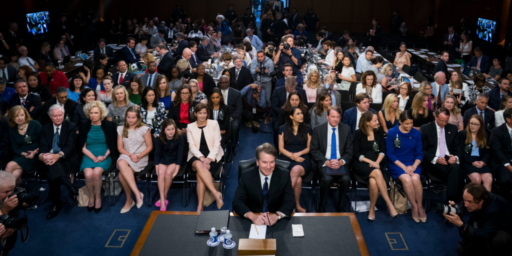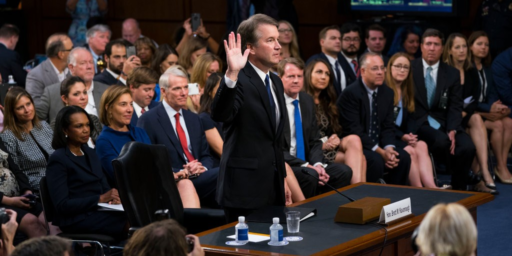Crisis of Confidence
Why have Americans lost trust in their institutions?

Dave Schuler observes,
I was going to write a post about the loss of confidence in a significant number of institutions, e.g. the Federal Reserve, the Supreme Court, the Catholic Church. When I started I realized that I struggled to think of any institutions in which we retained substantial confidence.
That has been developing for quite a number of years. Gone are the days in which a newscaster is the most trusted person in America.
and asks,
First, is there widespread (and well-deserved) confidence in any institutions these days? And second is it merely as Mme. de Cornuel put it more than 200 years ago that “no man is a hero to his valet”, i.e. when you know enough about anybody it tends to lower your confidence in them, or is there something new at work?
So, clearly, Cornuel’s explanation gets at part of it. We simply know a whole lot more about the institutions in question now than we did in the days when Uncle Walter was telling us “That’s the way it is“–almost 42 years ago now. Indeed, Cronkite has been out of the anchor chair more than twice as long as he occupied it.
The Catholic Church managed to keep a veil of secrecy over its shocking misconduct for generations. That ended more than 30 years ago.
I’m not sure the Supreme Court was ever trusted. “IMPEACH EARL WARREN” signs were a thing in the South before I was born. Still, Gallup polls going back to the mid-1970s had them above 60 percent most of the time—until the Trump administration. Surely, the cynical gambit to deny Merrick Garland a vote and then the Republicans ramming Brett Kavanaugh* through despite credible allegations of sexual misconduct didn’t help.
But commenter Steve gets at another big part of it:
It looks to me like trust in institutions is largely dependent upon who is in power and what the particular institution has done lately. The GOP now thinks SCOTUS is wonderful. The GOP loved the FBI when they found the emails, not so much when they investigated Trump. Not many people like Congress but people like their individual congressperson, if they are of the same party and for that matter they are OK with either house in Congress if it belongs to their party. Its all tribal.
The degree to which Americans have been sorted and polarized has been a constant subject here at OTB for quite a long time now and I won’t rehash it here. But one side effect of it is that damn near everything is now viewed through partisan lenses.
Steve’s FBI example is a good one: Democrats were furious with then-Director Jim Comey for the way he handled “her emails” while Republicans thought he bent over backward to exonerate her. But Russiagate and various other matters quickly turned the GOP against the Bureau.
Back to the Supreme Court: the aforementioned Gallup poll shows rather clearly that approval from Republicans and Democrats swing wildly—and in opposite directions—when controversial rulings are issued. The notion that the Justices are merely “umpires calling balls and strikes” is long last and rightly so. And both explanations apply: there’s simply way more reporting and commentary on the institution now than there used to be and it’s filtered through partisan lenses.
Within my own wheelhouse of civil-military relations, we have seen the United States military go from being perhaps the most consistently-admired major institution in our society to one with less-than-majority support—with a 25% drop between November 2020 to February 2022. And, no, it’s not because of losing efforts in two wars, for which the American public largely blames politicians. It’s because the military brass are increasingly seen as partisan political actors taking sides in the culture wars.
_________
*Yes, I’m aware that Neil Gorsuch, who was much less controversial, filled the seat to which Garland had been appointed. But the Kavanaugh controversy came soon enough.





Because Republicans are deliberately undermining any social institution that might limit their ability to accumulate and exercise power?
FFS. There’s are many reasons, but the biggest is what @Stormy Dragon: said. Republicans have been campaigning for 60 years that the government is bad, is incompetent, is the enemy. For the last 26 years aggressively supported by FOX “News” and now a bunch of others. Add to that their constant efforts when in power to hobble effective governance. And absolute shit like Gov. DeUseless empaneling a grand jury to investigate public health workers for trying to do their jobs. Keep hammering on the same message for sixty years it’s going to have an effect.
This did not fall from the sky because of institutional design or because of the anti-majoritarian Constitution. It happened because GOPs are assholes.
A big reason, there are far fewer gatekeepers that filter and explain the what is happening to the populace. The days of every metro area having its own, locally owned newspapers, radio and sometimes TV stations. All had a POV, but as a local consumer, you recognized what that was and adjusted your own thinking on the issue accordingly. Today, those news institutions are either gone or part of national chains, that continue to slant the news but are much more subtle in how that occurs. Add to that the gullibility of the news consumer that believes whatever some person on facebook or twitter says because of their own bias. Social media, is a prime destroyer of trust.
Frankly, interest groups on both the right and the left attempt to undermine institutions when it is to their benefit.
This ‘it’s just tribal partisanship’ explanation is too pat, doesn’t fully explain the tanking numbers for these institutions.
For example, if it were it case that SCOTUS approval/disapproval were merely swinging between partisans, then SCOTUS’s approval ratings should be relatively stable. The topline approval number wouldn’t be changing that much, what should change is who is doing the approving.
But that’s not what we’re seeing. We’ve seen SCOTUS approval tank. Disapproval of SCOTUS is broad, not just partisan, because it’s not just about rulings. You don’t necessarily have to disagree with Dobbs to find the Merrick Garland shenanigans, Ginni Thomas’s antics, leaks, and Alito’s sneering Fox News-esque speeches unseemly. Among other gross, hypocritical, and unethical behavior by the justices.
Says who?
We are more apt to accept information as correct if that information fits a pre-existing narrative or supports an existing belief. Replacing a constellation of beliefs, especially if they are wrapped up in identity, takes a lot of mental work, which people are usually only willing to put in if the payoff is quite large. What we value therefore impacts how we view others and hence whether we trust them or not. If someone has values at odds with ours, or is promoting information or a course of action that is at odds with those values, we will trust them less. If we trusted them too much then we might have to question our values to create a coherent worldview. It is much less work to simply accept information that comports with existing beliefs. Very few people welcome having their established narrative questioned.
@DK: Drezner says so. His argument is less than compelling. He didn’t address two wars, he noted the trend started down before the withdrawal from Afghanistan. Well, so did the perception of failure in Afghanistan. Also, too, the withdrawal is perceived as a failure because FOX/GOP worked very hard to make it look like a failure. Despite it being, overall, a pretty well done withdrawal.
The Democrats are concerned about undermining civic and political institutions such as the government in general, the FBI, the Supreme Court, media, schools, libraries, etc.
The Republicans are worried about the imminent collapse of religious, social, and cultural institutions such as religion, the family, heterosexuality, opposite sex marriage, anti-abortion legislation, etc.
Martin Gurri, call your office.
It is absurd to note “distrust” without clarifying whether the distrust is warranted or just partisan anger.
Like, a large number of people have “distrust” in vaccines.
Another large number have “distrust” in the police.
Liberals have “distrust” in Fox News.
Conservatives have “distrust” in CNN.
Are these equivalent?
Of course not. There does exist an objective truth here.
Anti-vax distrust is silly superstition fed by active grifters, while distrust in police reflects actual facts.
Fox News is , objectively, a propaganda organ of the Republican Party.
CNN is a reasonably accurate news organization.
Are these equal
I wonder what people mean by “trust.” I can think of several things. From being honest and truthful, to being committed to perform their duties in a fair and just manner.
Or simply, that someone can be counted on for something. For instance, I trust Benito the Cheeto to act in his own interest and screw as many people as he has to, and six more that he doesn’t just for the hell of it.
2 Words: Fox News. And their RW cohorts.
OK ok, that 6 words (or 7 depending how you spell RW ). Sue me.
Besides partisanship, and tying into the Cornuel explanation, I think a large factor is decades of the rich and powerful being seen to be getting away with almost everything. The sense that if a little guy did something they would end up in jail, but if a rich person did so it was fine. It’s something that has always been there of course, but again we not only have increased visibility to it, we have a partisan media environment (and social media supercharging everything) where accusations are even easier to spread and even harder to shake off. Result, a constant bombardment of “bad people” on the other side getting away with something that seems utterly outrageous (because of the news slant you consume). You can never escape the outrage and in the end you don’t feel like society’s institutions are there to protect YOU, they seem to exist to protect some enemy (political, economic, religious, whatever).
Billions of dollars are spent on election campaigning. The majority of the money is used for the personal destruction of the opposing candidates. Once elected, many of the constituents, whose opinion is wholly formed from the propaganda of the campaign, look with disdain on the elected along with their party and policies.
We reap what we sow.
@Steve Fetter:
And yet reelect those people in 2, 4, or 6 years, respectively, with great regularity. What is that phenomenon where you do the same things over and over while expecting different results called, again?
“The top 9 most terrifying words in the English Language are: I’m from the government, and I’m here to help.” From a guy that promised to make America great again, 40 years ago.